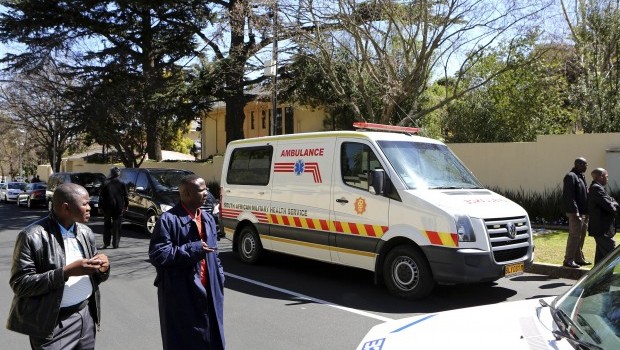
Members of the South African police stand guard near an ambulance that was escorting the ambulance which was believed to be carrying former South African President Nelson Mandela, outside his house in Houghton, Johannesburg September 1, 2013. (REUTERS/Siphiwe Sibeko)
Mandela, 95, had spent 87 days in a Pretoria hospital after he was rushed there in early June suffering from a recurring infection of the lungs, a legacy of the nearly three decades he spent in jail under apartheid.
“Madiba’s condition remains critical and is at times unstable. Nevertheless, his team of doctors are convinced that he will receive the same level of intensive care at his Houghton home that he received in Pretoria,” South Africa’s presidency said in a statement. It referred to Mandela by the traditional clan name by which he is affectionately known.
The Nobel Peace Prize laureate’s latest hospitalisation in June had attracted a wave of attention and sympathy at home and across the world.
His home in Johannesburg’s Houghton suburb had been “reconfigured” to allow him to receive special care there, the presidency added. Police blocked off a section of the street in the upscale neighbourhood, where a crowd of reporters and camera crews had gathered.
“The health care personnel providing care at his home are the very same who provided care to him in hospital. If there are health conditions that warrant another admission to hospital in future, this will be done,” the presidency added.
“It is a day of celebration for us, that he is finally back home with us,” Mandela’s grandson and heir Mandla said in a statement, acknowledging that he was “not a young man anymore”.
Mandla said his grandfather’s discharge from hospital disproved claims that Mandela was in a “vegetative” state “waiting for his (life) support machines to be switched off, in effect declaring him dead”.
Thousands of well-wishers had visited the Pretoria medical facility during his stay there to leave flowers, cards and gifts.
Mandela made his last public appearance waving to fans from the back of a golf cart before the Soccer World Cup final in Johannesburg in 2010. In April state broadcaster aired a clip of the thin and frail statesman being visited by President Jacob Zuma and top officials from the African National Congress.
The ruling party said he was “in good shape” but the footage showed a weak old man sitting expressionless in an armchair.
“He is out of hospital, that alone is good news for us. We don’t want to be thinking negative. We just want to remain optimistic. He is alive and kicking and a part of us, that’s good enough,” Motemi Tinashe said outside the Mandela Family House Museum in Soweto, south of Johannesburg, where he lived before his imprisonment.
For more than a decade Mandela has been out of politics, dividing his time in retirement between his home in Houghton and Qunu, the village in the impoverished Eastern Cape province where he was born.
His admission to hospital four times in six months has reminded the nation of the mortality of the father of the post-apartheid “Rainbow Nation” and the morals he stood for.
“I often wonder how much Mr Mandela knows about what is going on in South Africa and the state of politics. The ANC is a disappointment and I pray he doesn’t know that,” said Thomas Mkhize, a Johannesburg taxi driver.
“The current leaders care more about themselves and their pockets than the people,” he said. Many analysts and critics accuse the century-old ANC of having lost its moral compass.
The anti-apartheid leader was elected South Africa’s first black president in multi-racial elections in 1994 that ended white minority rule.
Mandela’s imprisonment included 18 years on the notorious Robben Island penal colony, when he and other prisoners were forced to work in a limestone quarry and he first suffered the lung infections that were to dog him for years.
The presidency requested that Mandela and his family be given “the necessary private space so that his continuing care can proceed with dignity and without unnecessary intrusion.”
